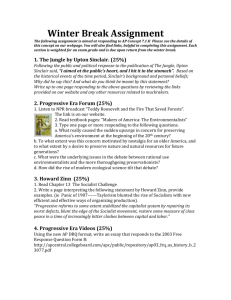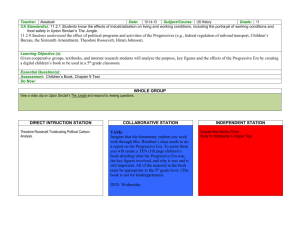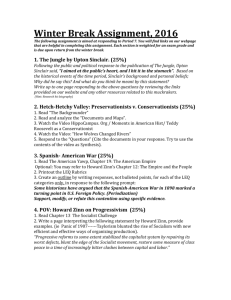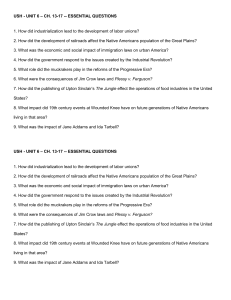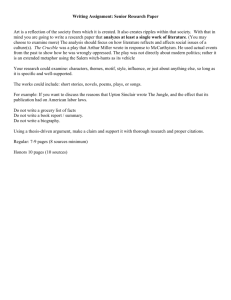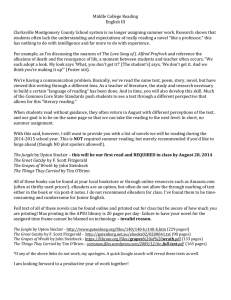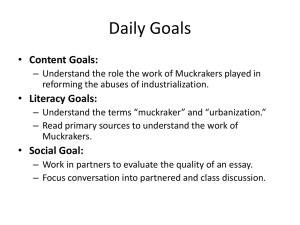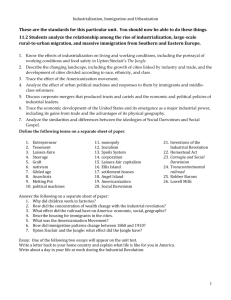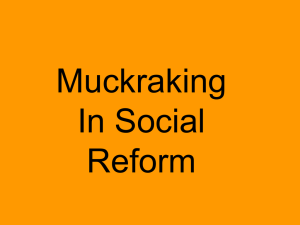Document 13317967
advertisement
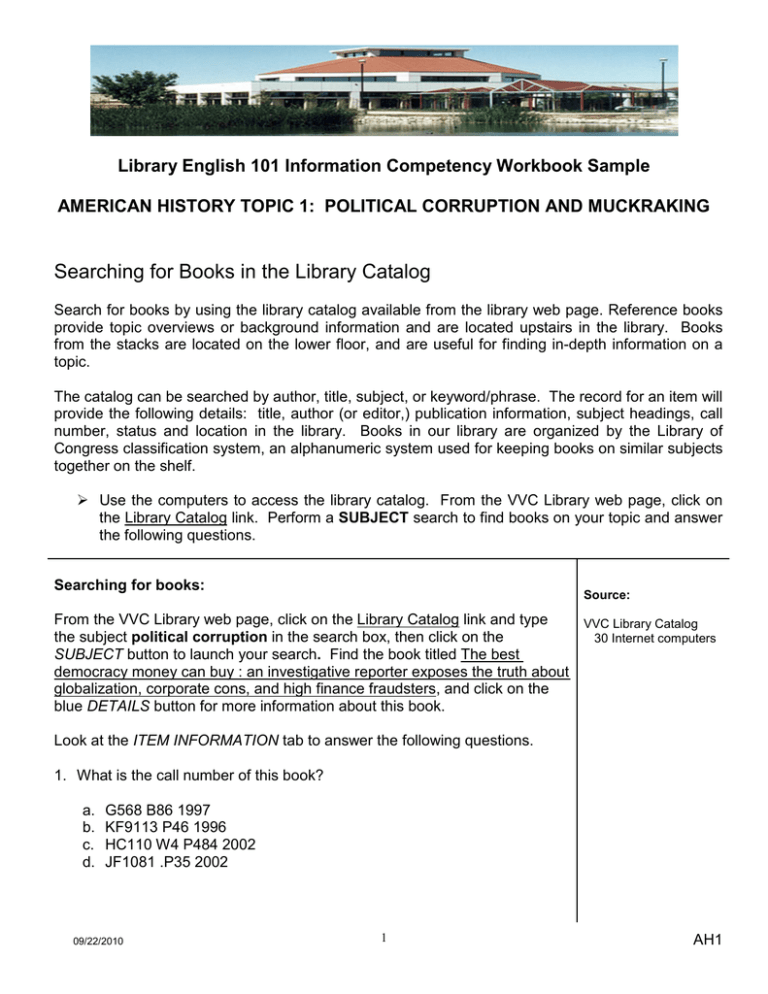
Library English 101 Information Competency Workbook Sample AMERICAN HISTORY TOPIC 1: POLITICAL CORRUPTION AND MUCKRAKING Searching for Books in the Library Catalog Search for books by using the library catalog available from the library web page. Reference books provide topic overviews or background information and are located upstairs in the library. Books from the stacks are located on the lower floor, and are useful for finding in-depth information on a topic. The catalog can be searched by author, title, subject, or keyword/phrase. The record for an item will provide the following details: title, author (or editor,) publication information, subject headings, call number, status and location in the library. Books in our library are organized by the Library of Congress classification system, an alphanumeric system used for keeping books on similar subjects together on the shelf. Use the computers to access the library catalog. From the VVC Library web page, click on the Library Catalog link. Perform a SUBJECT search to find books on your topic and answer the following questions. Searching for books: Source: From the VVC Library web page, click on the Library Catalog link and type VVC Library Catalog the subject political corruption in the search box, then click on the 30 Internet computers SUBJECT button to launch your search. Find the book titled The best democracy money can buy : an investigative reporter exposes the truth about globalization, corporate cons, and high finance fraudsters, and click on the blue DETAILS button for more information about this book. Look at the ITEM INFORMATION tab to answer the following questions. 1. What is the call number of this book? a. b. c. d. G568 B86 1997 KF9113 P46 1996 HC110 W4 P484 2002 JF1081 .P35 2002 09/22/2010 1 AH1 2. Where is this book located in the library? a. b. c. d. In the local history collection In the reference section At the circulation desk In the library stacks Click on the tab for CATALOG RECORD to answer the following questions. 3. Who is the author of this book? a. b. c. d. Alvin W. Wolfe Greg Palast Rodolfo Stevenhagen Mark Stein 4. What is another subject term for this book? a. b. c. d. Corporations -- Corrupt Practices Social Reform Politicians Reporters and reporting 5. Click on the answer to question 4 to determine if the VVC Library owns other books with this subject term. How many items are there? a. b. c. d. More than 15 items Fewer than four items Less than ten items No other items are listed 6. Click on the GO BACK link at the top of your screen. Click on the XREF link at the top of your screen to find other terms that may lead you to additional sources of information. What related topic is suggested? a. b. c. d. Elections Yellow Journalism Political Ethics Investigative Reporting 09/22/2010 2 AH1 Periodicals: Newspapers, Magazines and Academic Journals Periodicals are published on a routine, periodic basis and include newspapers, magazines and academic journals. They can provide the most current published information on a topic. They are useful in finding information on narrow topics, local issues, diverse viewpoints, and scholarly research. Newspapers A newspaper provides articles on local information, current events, news, sports, editorials, entertainment, and classified advertisements. Many newspapers are published daily and provide news for a local community or region. Use a Newspaper: To find articles and current information about local issues, national and international news To find editorials or commentaries Examples of Newspapers: Daily Press, San Bernardino Sun, Los Angeles Times Magazines A magazine is a collection of articles and images on current events, special topics, and popular interests written for a general audience. Magazine articles are usually written by journalists, although some articles may be written by scholars and some articles may not cite an author. Use a Magazine: To find articles about current events and popular culture To find articles on specific subject areas, such as sports, news, hobbies, etc. To find opinions, news, and background information To find general information for people who are not necessarily experts on a topic Examples of Magazines: Newsweek, Rolling Stone, Sports Illustrated, National Geographic Academic Journals An academic or scholarly journal is a collection of research-based studies on specific, academic topics written for professionals, scholars and researchers in an academic or professional field. Articles are peer-reviewed, which means they are approved by an editorial board and include a bibliography of all the references used to research the study. Use a Journal: To find academic, scholarly studies To find current research on a subject To find bibliographies with related research articles Examples of Journals: 09/22/2010 Journal of the American Medical Association, Annals of the American Academy of Political and Social Science, American Journal of Psychology, Childhood Education 3 AH1 Differences between magazines and journals: Author Magazine Journal Journalist or layperson, some articles do not cite an author Scholar, researcher or professional in an academic field Scholars and researchers in a field of study; Language is technical, specialized vocabulary of the field Research and news in a field of study Includes bibliography of references Peer-reviewed Membership in a professional organization, academic libraries, expensive Black & white text No advertisements Published monthly or quarterly Charts, graphs, tables Continuous pagination for a volume Audience General public; Language is for the average reader Contents Current events and general interest topics Few or no references Authority Availability and Cost Format Personal subscriptions, stores, libraries, inexpensive Glossy, high-color pictures Many advertisements Published weekly or monthly Short articles, easy to read Entertainment value Use the information about periodicals to answer the following questions: 7. Which of the following statements about popular magazines is true? a. b. c. d. 8. What is the best source to find local information, editorials, and current news? a. b. c. d. 9. Issues have few, if any, advertisements Articles are written for the general public Articles are in-depth and always have a bibliography of references Articles are written by scholars, researchers or professionals in an academic field Scholarly Journal Magazine Book Newspaper Which of the following describes an academic journal? a. Written by scholar, based on current research studies, includes bibliography, is peerreviewed b. Online daily news source freely available from the Internet c. Current listing of local sports competitions, national sports scores, reports on games d. Reviews of new movies, books and music CDs 09/22/2010 4 AH1 Recognizing an Article Citation An article citation provides all of the information needed to find an article from a periodical, such as a magazine, journal or newspaper. An article citation includes the following: o o o o o o title of the article author’s name name of the magazine, journal or newspaper where the article was published volume, issue and page number date of periodical issue abbreviations which mean that the article includes illustrations, portraits, graphs, tables or a bibliography AUTHOR’S NAME ARTICLE TITLE College savings plans require some new arithmetic. P.J. Lim. U.S. News & World Report v131 no4 NAME OF PERIODICAL VOLUME & NUMBER p48-51 Jl 30 2001 PAGE NUMBER DATE OF ISSUE Recognizing an article citation: 10. Which of the following examples is a citation to a periodical article? a. Henry, Robert S. “Muckraking.” History of American Politics. New York: Charles Scriber’s Sons, 1976. b. Sabato, Larry J. Dirty Little Secrets: the persistence of corruption in American politics. New York: Times Books, 1996. c. Corruption – Tip-offs from the general public. Liao Zinwen. Beijing Review. V43 no9 p21-22 F 28 2001 d. “Muckraking in America.” America History Online. <http://www.americahistory.net> 09/22/2010 5 AH1 Online Periodical Databases: Academic OneFile and NewsBank • • • • An online periodical database, such as Academic OneFile or NewsBank, is used to find articles from magazines, journals, or newspapers. Online databases are updated frequently and will provide access to recent news before it becomes available in print indexes or books. Some databases will also provide the full-text of articles, which can be printed or e-mailed. NOTE: even though you are using the Internet to access these databases, they are NOT considered an Internet source. These are fee-based sites which make articles from printed journals, magazines, and newspapers available in an electronic format. Use the computers to access the Internet. From the library’s web page, click on the DATABASES link, then use the Academic OneFile and NewsBank databases to search for periodical articles on your topic and answer the following questions. Searching for magazine or journal articles: 11. Use the Academic OneFile database to find periodical articles on your topic. Type muckraking movement in the search box and click on the GO button. Click on the link for Muckraking Movement to find a Magazine article titled “1906: uproar from 'The Jungle': a novel reveals foul conditions in the food industry and helps spur the reforms of the Progressive Era.” Who is the author of this article? a. b. c. d. Academic OneFile Internet computers, go to DATABASES Ahmad Motamedi Margaret Smith Daniel Schorr Peter Edidin 12. Which statement below best describes what this article is about? a. A history of the muckraking movement in America b. Sinclair and the other muckrakers wanted to expose what they saw as unfair or immoral practices by large corporations or trusts c. Biography of Upton Sinclair, author of The Jungle d. A book review of Upton Sinclair’s The Jungle National Geographic New York Times Upfront Time International Newsweek 09/22/2010 Tips: Online databases provide access to articles from newspapers, magazines and journals. The results may be a citation only, an abstract (one paragraph summary,) or the full-text that appeared in the printed periodical. The article citation has the details (author, title, periodical, date, volume, issue and page numbers) that are included in a list of works cited. 13. In what periodical is this article found? a. b. c. d. Source: 6 AH1 14. What is the date of this periodical? a. b. c. d. August 19, 2002 July 7, 2001 September 11, 2001 September 19, 2005 15. One of the Related Subjects (listed in the left-hand column) you could use to find more articles is: a. b. c. d. Communication Studies Tabloid Newspapers United States History Media Studies Searching for newspaper articles: Source: 16. Use the Home button on the Internet navigation toolbar to return to the library’s web page, then click on the DATABASES link. Use the NewsBank Access World News database to locate newspaper articles on your topic. Type muckrakers in the search box, choose Headline from the drop-down menu, and click on search. In what newspaper did the article “Taking Aim at Student Muckrakers” appear? a. b. c. d. Washington Post, The (DC) New York Times, The (NY) Boston Globe, The (MA) Los Angeles Times (CA) Tips: You can choose to have your search results displayed in order of relevancy or with the most current articles displayed first. 17. Who is the author of the article? a. b. c. d. NewsBank Internet computers, go to DATABASES Searching under suggested topics may provide additional information of value for your research. David Carr Roy Stryker Beverly Brannan Dorothea Lange 18. Which statement below best describes what this article is about? a. Murderers are always convicted of their crimes b. College students should only research articles related to their college c. Journalism is a growing career field for college students d. Undergraduate journalism students who investigate cases in which prosecutors charge the wrong people 09/22/2010 7 AH1 Internet Resources The Internet can be used to access a variety of information sources, such as current events and news, varying viewpoints, and information that is hard to find. There are several ways to find information on the Internet. Search engines, such as Google or Excite, use a program to search the Internet for web sites on a topic. Subject directories, such as Yahoo or Librarian’s Index to the Internet, are lists of web sites on a variety of topics that have been compiled by a person and can be browsed or searched. NOTE: anyone can post a web site on the Internet and there are no standards to ensure that a website contains accurate information. It is important to use a critical eye to evaluate the information you find on the Internet. Use the computers to access the Internet. The following questions include: searching an online catalog to find books at other libraries; using search engines and/or subject directories to find informative web sites; and reviewing criteria for evaluating web sites. Source: Understanding web pages: Internet computers, go to the VVC 19. Use the Home button on the Internet navigation toolbar to return Library Home Page to the library’s web page. Choose Research Tools, then select Understanding Web Pages. According to the information there, which of the following is NOT a standard web page element: Tips: a. b. c. d. Title Artwork URL Footer The Library Home Page URL is http://www.vvc.edu/library Please read the Acceptable Use Policy for Electronic Resources on the library’s Home Page. Evaluating web pages: 20. Use the Back button on the Internet navigation toolbar to return to the Research Tools page, then click on the Evaluating Web Sites link. Which one of the following is NOT a criteria used in evaluating web sites? a. b. c. d. authority currency accuracy consistency 09/22/2010 8 AH1 Searching for books at other libraries: 21. Use the Home button on the Internet navigation toolbar to return to the library’s web page. Select Other Libraries from the home page menu. Choose the University of California MELVYL. Do a subject search for investigative reporting. Under “Optional Limits” use the drop-down arrows and choose the library at UC Riverside, the format of books, and the language of English. Leave the year blank. How many books are available on your topic? a. b. c. d. Fewer than 10 More than 20 More than 100 More than 200 Searching with subject directories: 22. Use the Home button on the Internet navigation toolbar to return to the library’s web page and go to Internet Resources. Select Internet Search Tools and then Subject Directories. Go to Infomine and do a search for investigative journalism. One of the sites listed is MoJo Wire. According to the description, what is the purpose of this site? a. Investigative site that uncovers dubious political contributions b. Blog that reports on political scandals c. A grassroots nonprofit organization dedicated to improving the quality of investigative reporting d. The electronic version of Mother Jones magazine, a progressive periodical 23. Use the Home button on the Internet navigation toolbar to return to the library’s web page. Select Internet Resources, then go to Internet Search Tools and click on Subject Directories. Choose the Librarians’ Index to the Internet and do a search for investigative journalism. One of the sites listed is The Center for Public Integrity: Investigative Journalism in the Public Interest. According to the description of the site, what is the purpose of this organization? a. To conduct investigative research and report on public policy issues in the United States and around the world b. To expose political corruption by thorough investigation of elected government officials c. To provide educational services to reporters, editors and others interested in investigative journalism d. None of the above 09/22/2010 9 AH1 Reference Books The books upstairs in the library are called the “Reference” collection. Dictionaries, encyclopedias, handbooks, almanacs, yearbooks, atlases, directories and indexes are examples of reference books. They are usually referred to for facts or other information, and are not normally read from cover-to-cover. They must be used inside the library and cannot be checked out. Reference sources can be used to find the following: o Brief factual or statistical information o Introductions or overview of a subject o Answers to frequently asked questions o Guides to finding more information on a topic o Literary criticism Use materials from the Reference collection upstairs in order to become familiar with different types of sources and gain a basic understanding of how to use them. Remember to check the “Tips” in the right column if you need help finding these sources. Using reference sources: 24. Find the most recent volume of Twentieth-Century Literary Criticism (TCLC,) go to the “Topic Index” at the back of the book and look up muckraking movement in American journalism. In what volume of TCLC will you find this article? a. b. c. d. Source: Twentieth-Century Literary Criticism (TCLC) Ref. PN771 T89 Volume 57 Volume 34 Volume 24 Volume 49 25. Now find volume 34 of the TCLC and go to the article on muckraking. Included in the article is an illustration of a 1906 cartoon from Puck magazine. This cartoon depicts muckrakers as: a. b. c. d. Garbage men Wealthy business men Crusaders College professors Source: Dictionary of American History 09/22/2010 10 AH1 Ref. E174 D5 1976 26. Your next step is to look for more information on the Progressive Movement. Find an article on this subject in the Dictionary of American History. According to this reference book, the goals of the Progressive Movement included: a. b. c. d. Penalties for working women Tax reforms Subsidies for wealthy farmers Tax breaks for businesses 27. A third party was formed in 1912 as a result of the Progressive Movement. It was called the: a. b. c. d. Bull Moose Party Know Nothing Party United We Stand Party Libertarian Party Source: 28. One of the leaders of reform was Senator Robert La Follette of Wisconsin. Find a biography of the senator in the American National Biography. According to this article, when La Follette met his wife they were both studying: a. b. c. d. Teaching Business Law Nursing American National Biography Ref. CT213 A68 1999 Tip: Consult the index in the back of the book to locate information in most reference works. If the source is part of a multivolume set, the comprehensive index usually appears in the last volume of the set. 29. In 1924 La Follette was the third-party nomination for President under the: a. b. c. d. Progressive Party Democratic Party Libertarian Party Communist Party 09/22/2010 11 AH1 Book Reviews and Biographical Information Book reviews and biographical information can be used to help you evaluate the resources you find by providing background information on a book and the qualifications of the person who wrote it. Book reviews summarize and critique the ideas presented in books, which may provide you with a better understanding of a book and help you to determine if it is relevant to your research. Print indexes, such as the Book Review Digest or Book Review Index, are good sources for finding book reviews published in periodicals. Reference books can provide biographical information about authors, including details about their education, background, publications, and qualifications to write on a particular subject. Examples of biographical sources are Contemporary Authors and Current Biography Yearbook. Use the print indexes located on the Index Tables to find citations or abstracts for book reviews. Then you will use books in the Reference collection to find biographical information about authors or other people. Finding book reviews: Source: Use the 1906 volume of Book Review Digest to find book reviews for the novel The Jungle by Upton Sinclair. Look up reviews by the author’s last name. Book Review Digest is located on the index tables 30. What magazine contained the review that said this book “is one of the strongest and most powerful voices of protest against a great wrong that has appeared in America.” a. b. c. d. Saturday Review Newsday Arena New York Times 31. What was the date of issue of this review? a. b. c. d. June 1906 February 1905 September 5, 1906 April 18, 1906 32. How many words are there in the review? a. b. c. d. 2250 5780 240 950 09/22/2010 12 AH1 Finding biographical information: Sources: 33. Use the Contemporary Authors series to find biographical information about the author, Upton Sinclair. Start by using the Contemporary Authors Cumulative Index to look up the author. What volume of Contemporary Authors New Revision Series (CANR) has information about Upton Sinclair? Contemporary Authors Cumulative Index Ref. PN451 C6 Index a. b. c. d. 9 7 28 42 Contemporary Authors New Revision Series Ref. PN451 C63 Tips: Contemporary Authors Cumulative Index is a master index to numerous literature resources, and thus can help you locate information on authors and their works. 34. Use the volume of Contemporary Authors New Revision Series (CANR) from the question above to answer the following three questions. According to the “PERSONAL” section, Upton Sinclair There are numerous sources that died in what year? a. b. c. d. contain book reviews and biographies. The above sources are examples. The librarian can assist you in choosing the best source in which to locate the information you need. 1964 1968 1947 1950 35. According to the “PERSONAL” section, Sinclair was born in: a. b. c. d. Los Angeles, California Portland, Oregon Baltimore, Maryland Springfield, Illinois 36. According to the “WRITINGS” section, one of Sinclair’s pseudonyms was: a. b. c. d. Timothy O’Neill George Kalen Clarke Fitch Isaac Stern 09/22/2010 13 AH1 Works Cited – The MLA Format When writing a research paper, you will need to cite all of the sources you used, whether you are quoting directly from a book or article or using someone else’s ideas in your own words. Style manuals such as the MLA Handbook for Writers of Research Papers (MLA style) and the Publication Manual of the American Psychological Association (APA style) provide guidelines for writing papers and citing sources. Lists of work cited must follow strict guidelines as prescribed in these style manuals. Avoid plagiarism: cite all of the resources used in a list of works cited or bibliography at the end of a research paper. Use the MLA Handbook for Writers of Research Papers, which is located on the dictionary stand behind the reference desk, to determine the proper format for a works cited list for a journal article, book, online source, and reference book. Using the MLA format to cite sources: Source: Scholarly journal article: A better statutory approach to whistle-blowing. T. M. Dworkin. Business Ethics Quarterly. v7 no1 p1-16 Jan. 97 37. What is the correct MLA format for listing an article from a scholarly journal in a works cited page? a. Dworkin, T. M. “A Better Statutory Approach to WhistleBlowing.” Business Ethics Quarterly 7.1 (1997): 1-16. Print. MLA Handbook for Writers of Research Papers is located on the Dictionary Stand behind the Reference Desk Tip: See page 137 of the MLA Handbook for an article in a scholarly journal b. Dworkin, T. M. “A Better Statutory Approach to WhistleBlowing.” Business Ethics Quarterly, Vol. 7, 1997, p. 1-16. Print. c. Dworkin, T. M. “A better Statutory Approach to WhistleBlowing.” Business Ethics Quarterly 7, 1997. P 1-16. d. T. M. Dworkin. “A Better Statutory Approach to Whistle-Blowing.” Business Ethics Quarterly 7(1997) 1-16. Print. 09/22/2010 14 AH1 Sample book entry: UPTON SINCLAIR THE JUNGLE ROBERT BENTLEY, INC. 872 Massachusetts Avenue Cambridge, Massachusetts 02139 1946 38. How would you cite the book on the above sample page in the MLA format? a. Sinclair, Upton: The Jungle. Cambridge, Robert Bentley, Inc., 1946. Print. b. Sinclair, Upton. The Jungle. Cambridge, Robert Bentley, Inc., 1946. c. Sinclair, Upton. The Jungle. Cambridge: Robert Bentley, 1946. Print. d. Upton Sinclair, The Jungle. Cambridge: Robert Bentley, Inc., 1946. Print. 09/22/2010 15 Tip: See page 148-149 of the MLA Handbook for a book by a single author AH1 Scholarly journal article from an online database: Global muckraking: the international impact of Upton Sinclair's The Jungle. Michael Hussey. Teaching History: A Journal of Methods. v34 no1 p29+ Spring 2009. Tip: See page 192-193 of the MLA Handbook for a periodical article from an online database. Database: Academic OneFile Date of Search: June 2, 2010 39. According to the MLA Handbook, what is the correct format for listing this scholarly journal article from the Academic OneFile database? a. Hussey, Michael. Global Muckraking: The International Impact of Upton Sinclair's The Jungle. Teaching History: A Journal of Methods 34-1 (Spring 2009). Academic OneFile. Web. 2 June 2010 b. Michael Hussey. “Global Muckraking: The International Impact of Upton Sinclair's The Jungle.” Teaching History: A Journal of Methods. (2009) Academic OneFile. 2 June 2010. Online. c. “Global Muckraking: The International Impact of Upton Sinclair's The Jungle.” Teaching History: A Journal of Methods. V34 no1. Academic OneFile. 2 June 2010. Web. d. Hussey, Michael. “Global Muckraking: The International Impact of Upton Sinclair's The Jungle.” Teaching History: A Journal of Methods 34.1 (2009): 29+. Academic OneFile. Web. 2 June 2010. Tip: 09/22/2010 16 AH1 Sample web site entry: See pages 184-187 of the MLA Handbook for a web site citation. Author: No author available Title of work: Upton Sinclair Web site name: Social Security History Publisher or sponsor of the site: Social Security Online History Date of publication: No date available Date of search: June 2, 2010 Web address: http://www.ssa.gov/history/sinclair.html 40. Use the MLA Handbook to cite the web site described above in the proper format. a. “Upton Sinclair.” Social Security History. Social Security Online History, n.d. Web. 2 June 2010. b. Social Security History. “Upton Sinclair.” Social Security Online History. 2 June 2010. <http://www.ssa.gov/history/sinclair.html> c. “Upton Sinclair.” Social Security Online History. Web. 2 June 2010. d. Upton Sinclair. “Social Security History. Social Security Online History.” Online site from the World Wide Web. 2 June 2010. 09/22/2010 17 AH1
